THE

GUIDE TO
BORDERLINE
PERSONALITY DISORDER
Dear Reader:
Borderline personality disorder is one of the most stigmatized and misunderstood mental health issues we have. It can create confusion and pain for the person suffering with it and for the loved ones who must deal with the symptoms.
I first encountered borderline personality disorder when I worked with substance abuse clients. The people I worked with exuded a distinct need and a fear of being alone. The families often felt the same way. It is a serious disorder with little in the way of information and reference for the people concerned. For some the world seems hopeless. They do not know where to turn or what to do.
But there is hope. Research has given new information on treatment options that can work. Many people with borderline personality disorder who seek and work within the guidelines of treatment see a large reduction in symptoms. There are people out there who care and who are ready to help. Have faith in your ability to make it through this and help your loved one live a happier life.

Welcome to the

Series!
These handy, accessible books give you all you need to tackle a difficult project, gain a new hobby, comprehend a fascinating topic, prepare for an exam, or even brush up on something you learned back in school but have since forgotten.
You can choose to read an Everything book from cover to cover or just pick out the information you want from our four useful boxes: e-questions, e-facts, e-alerts, and e-ssentials. We give you everything you need to know on the subject, but throw in a lot of fun stuff along the way, too.
We now have more than 400 Everything books in print, spanning such wide-ranging categories as weddings, pregnancy, cooking, music instruction, foreign language, crafts, pets, New Age, and so much more. When youre done reading them all, you can finally say you know Everything!

PUBLISHER Karen Cooper
DIRECTOR OF ACQUISITIONS AND INNOVATION Paula Munier
MANAGING EDITOR, EVERYTHING SERIES Lisa Laing
COPY CHIEF Casey Ebert
ASSISTANT PRODUCTION EDITOR Melanie Cordova
ACQUISITIONS EDITOR Kate Powers
SENIOR DEVELOPMENT EDITOR Brett Palana-Shanahan
EDITORIAL ASSISTANT Ross Weisman
EVERYTHING SERIES COVER DESIGNER Erin Alexander
LAYOUT DESIGNERS Erin Dawson, Michelle Roy Kelly, Elisabeth Lariviere, Denise Wallace
Visit the entire Everything Series at www.everything.com
THE

GUIDE TO
BORDERLINE PERSONALITY
DISORDER
Professional, reassuring advice for coping with the
disorder and breaking the destructive cycle
Constance M. Dolecki, MS, PhDc

This book is dedicated to all who deal with a mental health issue. The stigma eases each time people are open to learning and growing.
Acknowledgments
I would like to thank my family for giving me the encouragement and support to complete this book. My husband, Bernie, kept me centered and motivated. I would also like to thank Kate Powers for giving me the opportunity to write this book and the patience to help me get through to the end. Last, but not least, I would like to thank the Cattaraugus County Council on Alcoholism and Substance Abuse, which gave me my start as a therapist and will always hold a place in my heart.
Top 10 Things You Can Do to Help Your Loved One with BPD
- Attend any therapy sessions you are invited to and learn about the treatment plan.
- Stick to the instructions you are given by the therapist in order to keep your loved one on the treatment plan.
- Learn and practice healthy ways of easing the pain and coping with the outbursts.
- Avoid taking on responsibility that is not yours. That leads to enabling behaviors.
- Do not accept blame or guilt when accusations fly. That leads to enabling behaviors.
- Be consistent in your own behaviors. If something is unacceptable today, it is unacceptable tomorrow. Do not give in one day and stay firm the next.
- Seek support and help for yourself.
- Do not get embarrassed or isolate yourself because of what you live with.
- Learn as much as you can about the disorder so you can recognize what is going on.
- Keep hope and keep going. Do not give up.
Introduction
Borderline personality disorder (BPD) is a mental health disorder that affects how a person processes information and his or her ability to understand and cope with different social situations. People with borderline personality disorder have problems recognizing how they should and should not act, which makes it hard for others to be around them. Friends and family members can get caught up in the whirlwind of emotions and disorganization that are characteristic of people with this disorder. The symptoms often affect others almost as much as they affect the person dealing with the disorder itself, and the resulting hurt, frustration, and confusion leave many wondering what to do next.
Borderline personality disorder also affects how people see themselves and what they do as a result. People with this disorder are usually impulsive and do not always make thoughtful decisions. They often go through a series of unstable relationships and experience mood shifts that create emotional extremes. They will be in a loving relationship one moment and then ready to end it the next. This roller coaster of emotions often turns other people off.
Fortunately, there are things that can be done to help navigate borderline personality disorder. People who live with or are around this disorder on a continual basis can benefit from learning more about what borderline personality disorder is, what might cause it, and what works best in treating it. Managing this disorder is work, but it can be done, and all concerned can enjoy life. Research uncovers more helpful information every day, and new forms of treatment are having success in generating improvements. Personality disorders are not easy to live with or work with, but increased understanding helps create successful options.
CHAPTER 1
The Basics of Borderline Personality Disorder
Borderline personality disorder is an issue that affects how people process and express thoughts and behaviors. People with borderline personality disorder do not necessarily understand social events or the dynamics of relationships the same way people who are considered healthy do. It is hard for them to understand and work within proper social guidelines that allow for compromise and negotiation. They tend to see things in black and white, making situations either win or lose, with nothing in between. When things do not go the way they think they should, they do not feel good about themselves and they do not feel good about their interaction with other persons. This often leads to behaviors that go against social norms and the way most people would expect a person to react.

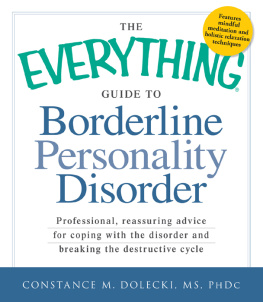

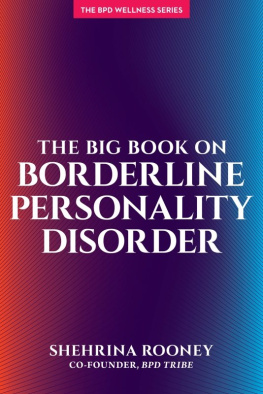

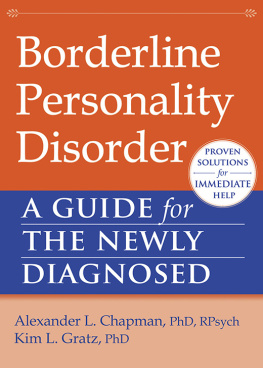
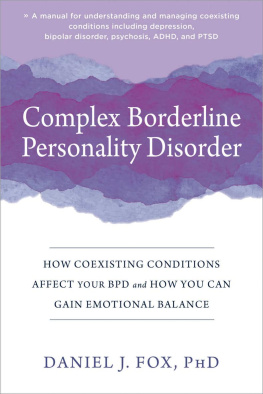
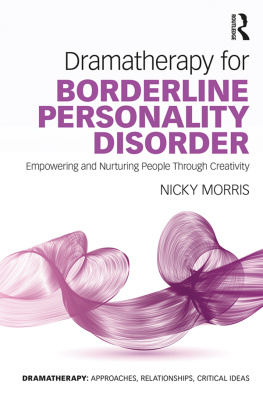
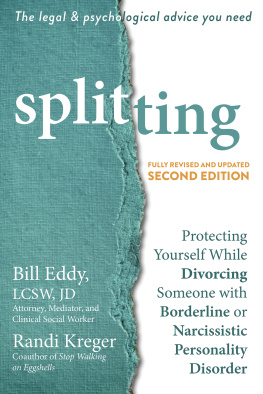
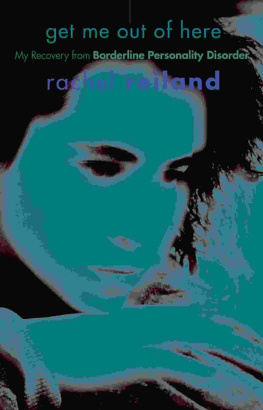



 Series!
Series!
